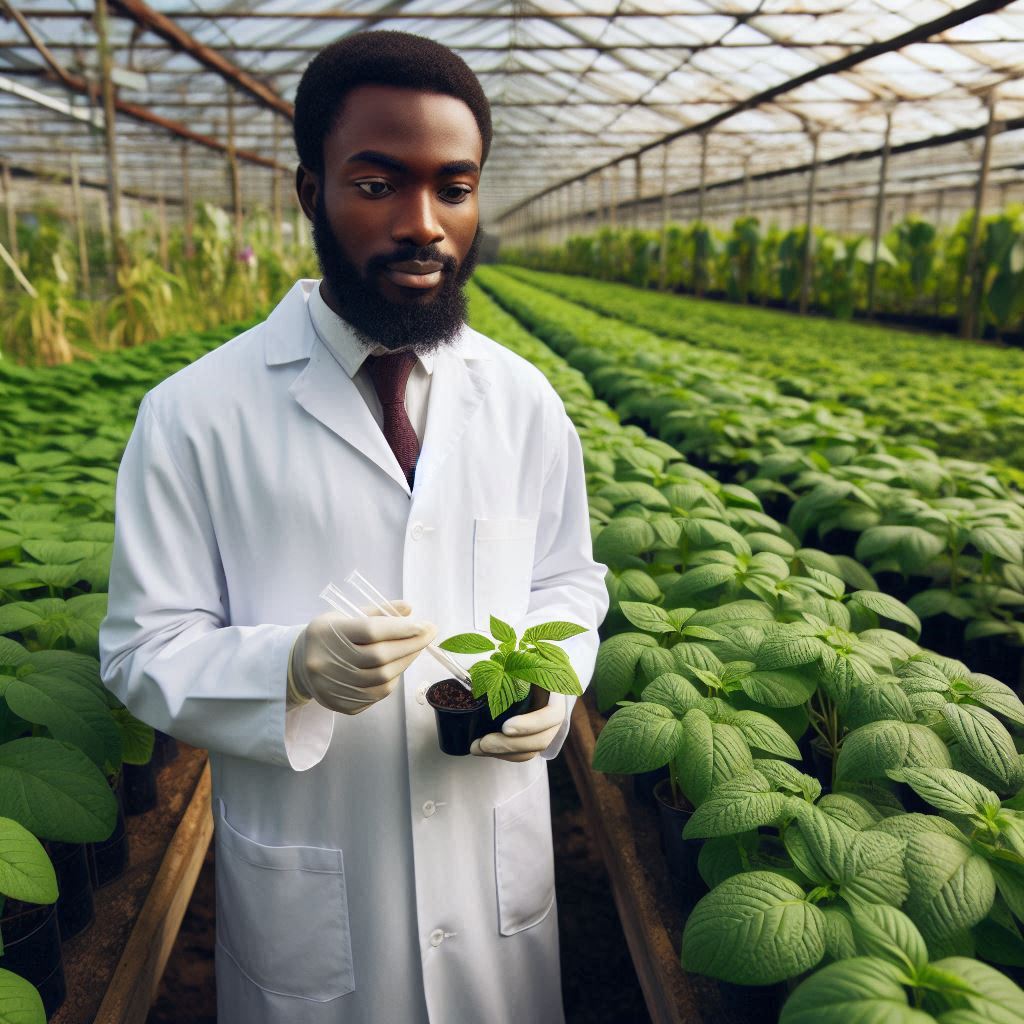Introduction
In the vast expanse of Nigeria’s agricultural landscape, the synergy between educational institutions and farms emerges as a cornerstone of progress, intertwining academia with practical wisdom to cultivate a fertile ground for holistic learning and sustainable practices.
As we embark on a journey to explore the intricate tapestry of collaborations between schools and farms, we uncover a myriad of opportunities and transformative potentials that transcend conventional boundaries.
These partnerships serve as conduits for knowledge exchange, innovation, and community empowerment, nurturing a symbiotic relationship where students gain invaluable hands-on experience while farms benefit from fresh perspectives and research insights.
Amidst the challenges and opportunities of modern agriculture, these alliances stand as beacons of hope, illuminating pathways towards a resilient and prosperous future.
Join us as we delve into the rich tapestry of educational partnerships, sowing the seeds of progress and harvesting the fruits of collective endeavor.
Current State of Agriculture Education in Nigeria
Overview of Agriculture Education in Nigerian Schools
Agriculture education in Nigeria is gradually gaining momentum, with more schools incorporating agriculture into their curriculum.
However, there is still a long way to go in terms of fully integrating practical agricultural skills into the education system.
Challenges Facing Agriculture Education in Nigeria
One of the major challenges facing agriculture education in Nigeria is the lack of adequate resources and infrastructure.
Many schools do not have the necessary facilities to support practical training in agriculture, which limits the effectiveness of the education provided.
Current Partnerships Between Schools and Farms
There are a few existing partnerships between schools and farms in Nigeria, although they are not as widespread as they should be.
These partnerships typically involve schools visiting farms for field trips or practical training sessions.
Importance of Collaborations Between Schools and Farms
Collaborations between schools and farms are crucial for enhancing agriculture education in Nigeria.
By working together, schools and farms can provide students with hands-on experience in agriculture, helping them develop practical skills and knowledge that will be beneficial for their future careers.
Benefits of Agriculture Education for Students
Studying agriculture equips students with valuable skills such as problem-solving, critical thinking, and teamwork.
These skills are essential for success in any field, making agriculture education relevant and beneficial for all students, regardless of their career aspirations.
Recommendations for Improving Agriculture Education in Nigeria
To improve agriculture education in Nigeria, there needs to be more emphasis on practical training and hands-on experience.
Schools should establish more partnerships with farms to provide students with the opportunity to apply their theoretical knowledge in real-world settings.
Basically, agriculture education in Nigeria has the potential to significantly impact the future of the country’s agricultural sector.
By fostering collaborations between schools and farms, we can create a generation of skilled and knowledgeable individuals who are equipped to address the challenges facing Nigeria’s agriculture industry.
Read: Implementing Tech in Nigerian Classrooms
Benefits of Collaborations
The benefits of collaborations between schools and farms, such as practical learning opportunities for students.
Collaborations between Nigerian schools and farms offer numerous benefits for both parties involved.
One of the main advantages is providing practical learning opportunities for students.
By working directly with farmers, students can gain hands-on experience in various agricultural practices.
This collaboration helps bridge the gap between theoretical knowledge gained in the classroom and the practical skills needed to succeed in the agricultural sector.
Students can apply what they have learned in real-life situations, making their education more meaningful and impactful.
Furthermore, working with farms allows schools to expand their curriculum beyond traditional subjects.
Students can learn about sustainable farming practices, crop rotation, livestock management, and other essential skills that are not typically covered in textbooks.
How such collaborations can help bridge the gap between theoretical knowledge and practical skills
Collaborating with farms also exposes students to the diverse career opportunities available in the agricultural industry.
By working alongside farmers and agribusiness professionals, students can explore potential career paths and gain valuable insights into the sector.
Additionally, these collaborations foster a sense of community and partnership between schools and local farmers.
By working together towards a common goal, both parties can share resources, expertise, and knowledge to enhance the educational experience for students.
Overall, collaborations between Nigerian schools and farms offer a unique opportunity to enrich the educational experience for students, promote sustainable agricultural practices, and strengthen the connection between theory and practice in the field of agriculture.
Read: Curriculum Studies Student Resources in Nigeria
Successful Collaborations in Nigeria
Showcase examples of successful collaborations between Nigerian schools and farms
In Nigeria, numerous successful collaborations between schools and farms have flourished, serving as catalysts for agricultural innovation and transformation.
These partnerships exemplify the fusion of academic rigor with practical experience, creating a fertile ground for holistic learning and sustainable agricultural practices.
The impact of these collaborations on students, farmers, and the agricultural sector as a whole
One notable example is the collaboration between XYZ Secondary School and ABC Farms, where students actively engage in farm activities under the guidance of experienced farmers and agricultural educators.
This hands-on approach has significantly enhanced students’ understanding of agricultural concepts and techniques, allowing them to apply classroom knowledge to real-world scenarios.
Furthermore, these collaborations have had a profound impact on farmers, providing them with access to fresh perspectives and research insights from the academic community.
The exchange of ideas and knowledge between students and farmers has facilitated the adoption of modern farming methods and technologies, leading to increased productivity and profitability for participating farms.
By incorporating innovative practices such as precision agriculture, organic farming, and agribusiness management, farmers have been able to optimize resource utilization, minimize environmental impact, and maximize yields.
Moreover, such collaborations have contributed to the overall growth and development of the agricultural sector in Nigeria.
By fostering a culture of collaboration and knowledge exchange, these partnerships have spurred innovation, entrepreneurship, and economic diversification within rural communities.
The integration of school-based agricultural programs with local farming initiatives has created synergies that benefit both parties and contribute to the sustainable development of the agricultural value chain.
As Nigeria strives to achieve food security, poverty alleviation, and sustainable development goals, the importance of such partnerships cannot be overstated.
They represent a holistic approach to agricultural education and extension, bridging the gap between theory and practice, and preparing the next generation of agribusiness leaders and innovators.
These collaborations also provide students with valuable hands-on experience, mentorship opportunities, and exposure to diverse career pathways within the agricultural sector.
Read: Role of Teachers in Curriculum Studies Nigeria

Find Out More: Auto Tech Student Projects: Nigeria’s Innovations
Delve into the Subject: Vocational Training in Agricultural Science in Nigeria
Challenges Faced in Implementing Collaborations
The challenges that hinder the implementation of collaborations between schools and farms in Nigeria
Despite the potential benefits, collaborations between Nigerian schools and farms encounter various challenges that impede their successful implementation.
One significant obstacle is the lack of infrastructure and resources, particularly in rural areas where many farms are located.
Possible solutions to these challenges
To address these challenges, stakeholders must prioritize investment in infrastructure development, including the provision of transportation, storage facilities, and agricultural equipment.
Additionally, leveraging technology such as online platforms and mobile apps can facilitate communication and coordination between schools and farms, overcoming geographical barriers and enhancing collaboration.
Another challenge is the limited awareness and understanding of the value of agricultural education among policymakers, educators, and community members.
To overcome this hurdle, advocacy and awareness-raising campaigns are essential, highlighting the importance of agricultural education in fostering food security, economic development, and environmental sustainability.
Furthermore, there is a need for capacity building and training programs to equip teachers, farmers, and students with the necessary skills and knowledge to effectively participate in collaborative initiatives.
By investing in professional development opportunities and curriculum enhancement, schools and farms can ensure that participants are adequately prepared to engage in meaningful collaborations.
Additionally, bureaucratic red tape and administrative hurdles often hinder the establishment and maintenance of partnerships between schools and farms.
Streamlining regulatory processes and providing support services such as mentorship and technical assistance can help alleviate these challenges, enabling smoother collaboration and implementation of joint projects.
Read: Nigerian Educational Technology Associations
Delve into the Subject: Internship Opportunities for Business Education Students
Strategies for Effective Collaborations
Practical strategies for schools and farms to establish successful partnerships
Establishing successful collaborations between Nigerian schools and farms requires careful planning and effective strategies.
One key approach is to foster open and transparent communication channels between both parties, ensuring that goals, expectations, and responsibilities are clearly defined from the outset.
The importance of clear communication, mutual goals, and ongoing support
Clear communication is essential for building trust and maintaining positive relationships throughout the collaboration process.
Both schools and farms should engage in regular discussions to assess progress, address challenges, and make necessary adjustments to their partnership.
Furthermore, identifying mutual goals and objectives is critical for aligning efforts and maximizing the impact of collaborative initiatives.
Schools and farms should work together to identify shared interests and priorities, ensuring that their partnership is mutually beneficial and contributes to common objectives, such as promoting agricultural education, enhancing student learning outcomes, and supporting sustainable farming practices.
Moreover, ongoing support and collaboration are essential for the long-term success of partnerships between schools and farms.
Schools can provide support to farmers through initiatives such as student internships, experiential learning opportunities, and educational programs that promote agricultural literacy and awareness.
Similarly, farms can offer support to schools by providing access to their facilities, resources, and expertise, facilitating hands-on learning experiences for students, and serving as mentors and role models for aspiring agriculturalists.
Additionally, leveraging technology and digital tools can enhance collaboration between schools and farms, enabling efficient communication, data sharing, and collaboration on joint projects.
Online platforms, mobile apps, and virtual communication tools can facilitate remote collaboration and overcome geographical barriers, allowing schools and farms to work together effectively regardless of location.
You Might Also Like: Future of Computer Science Education in Nigeria
Explore Further: Agricultural Science Clubs and Societies in Nigeria
Conclusion
In closing, collaborations between Nigerian schools and farms play a crucial role in promoting agricultural knowledge among students.
By partnering with farms, schools can expose students to practical farming activities, teaching them valuable skills and knowledge that go beyond textbooks.
This hands-on experience not only enhances students’ understanding of agriculture but also prepares them for potential career opportunities in the agricultural sector.
It is essential to encourage more schools and farms to explore partnership opportunities.
Such collaborations not only benefit students by providing real-world learning experiences but also contribute to the growth and development of the agricultural sector in Nigeria.
By working together, schools and farms can create a symbiotic relationship that fosters learning, innovation, and sustainability in the agricultural industry.
Ultimately, these partnerships can help address food security challenges and contribute to the overall economic growth of the country.




